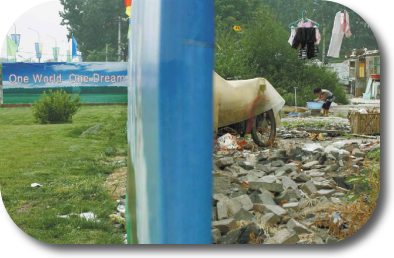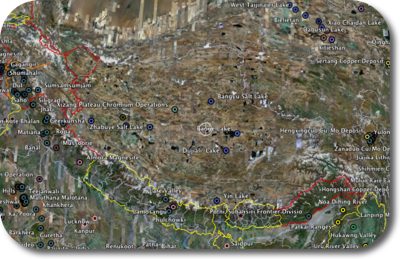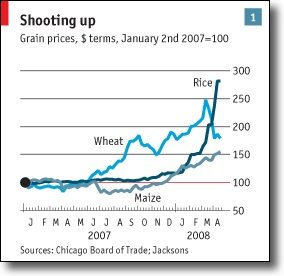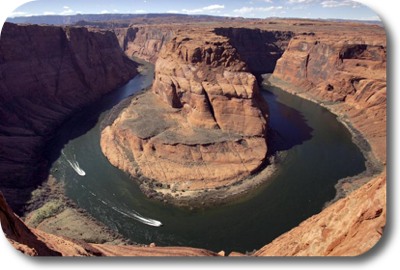Archive for the ‘Politics’ tag
Update, Water Debate: The Value of H2O
Folks,
the response to the regression line post was straight out phenomenal and mind-blowing. In the next sequel, we will look at some real data. I had this planned for today, but unfortunately preparing for the NUPUS conference, at which I will take part next week, takes longer than anticipated. I promise I will post on monday again.
However, I do have a suggestion for your weekend (if you’re not planning to climb up any mountains or if you are sick at home): read this!
I just found out that “the economist” has a sequel of classic debates, on various topics. The debate I’m suggesting for you to read is entitled “The value of H2O” — This house believes that water, as a scarce resource, should be priced according to its market value. Defending the motion is Mr Stephen J. Hoffmann, who recently published a book which is called just like this blog
(more about this really soon). The arguments against the motion are represented by Dr Vandana Shiva.
World Water Forum Istanbul
Currently, the 5th World Water Forum takes place in Istanbul. Its subtitle is “Bridging Divides for Water” hinting at the necessary turning point for water resources: making drinking water available for everybody. It seems like the geographic location of Istanbul might be a proper choice for that theme. There are six main themes, around which sessions are grouped: “Global Change and Risk Management”, “Advancing Human Development and the MDGs”, “Managing and Protecting Water Resources”, “Governance & Management”, “Finance”, and “Education, Knowledge and Capacity Development”.
Additionally, there is a big exposition with booths from participating countries and companies. There are “high level panels” on “water and disasters”, on “local financing”, on “water, food, and energy”, on “sanitation”, and on “water and climate change”.
The main webpage is huge, and it is a little hard to find out what is happening where. It seems like a huge congress though. It will be interesting to see what the outcomes are! The Guardian reports on the congress and on protesters. The article quotes Maude Barlow, recipient of the 2005 Right Livelihood Award and chairperson of The Council of Canadians:
It’s organised to look like a UN-type event but it’s not. […] It’s really just a big trade show put on by the big water companies. There is going to be no mention of water as a human right. They don’t want to support that because they see water as a commodity to be sold on the open market. There is mounting evidence that privatisation has failed. We believe water should be a public trust.
Maude Barlow is also member of the organizing committe of the “Alternative Water Forum“, which also takes currently place (March 20 to 22), also in Istanbul.
The Olympics are over. What remains?
The Olympics are over. They are still, despite the doping problems, an awesome sports events. I did not get the chance to watch much due to the time difference between China and Germany. But I do have one favorite moment: the team table-tennis semi-finals between Germany and Japan. Such a close game, and so brilliant sports. Pictures connect and I just found this blog by the gang of Newsweek photo-journalists, some exceptional photographers, who covered the Olympics for their magazine. Shown below are some images related to water from those guys blog.
One of these Newsweek photographers, Donald Miralle, writes about one such cool moment, the 100m mens’ final. He describes how such moments remain cool moments, but the main characters fade away very soon:
[…] Peter Reid Miller of Sports Illustrated posed the question to me tonight before the start of the finals, “Do you even remember who won the 100 in Athens?” I was there, I shot it, I remember taking an OK frame of it, but for the life of me I couldn’t remember who won [It was Justin Gatlin of the U.S.–ED]. And you know why, after tonight NOBODY CARES. The athlete, whether it’s one of the Jamaicans or the American, will be on the front cover of every newspaper and Website for the next 24 hours. You won’t see them again in the headlines for another four years. Unless, that is, one of them tests positive for doping…
Besides sports, the Olympic games put the focus on China. Here in Germany, every day there was some report on something in China. This is, I think, how this relates to planetwater: So many people live in China, and there are so many environment-related problems. Some problems were created specifically because of the Olympics — the water for the white water canal had to come from somewhere, whereas everything in this area usually is rather dry. So these are some environmental problems related to the Olympics I am aware of:
Environment
- water problems — this is only one example of many. And we will not talk about the Three Gorges Damn now.
- air quality problems do exist (see also here) in Peking, for the Olympics cars were taken from the road (Spiegel a and b), and factories were shut down
- there were health concerns before the start of the Olympics, I haven’t heard, seen, or read any about this after the start of the Olympics
- there were big problems with algae in the water where the sailing and rowing events took place. The algae were removed by manual labour. These problems did not seem to exist during the Olympics
For the course of the Olympics, it seemed like those problems were handled (maybe not exactly solved) fairly well. But what about now? Factories can not be shut down for ever. And I would guess that the cars will push onto the streets again fairly soon. And the eye of the international media will not be there anymore, not to the extent as during the Olympics anyways. The human rights issues that exist in China were not ignored in “Olympic TV coverage”, and human rights are the basis for any human being:
Human Rights
- two old women were sentenced to re-education camp after they tried to protest for not receiving sufficient compensation when their homes were seized for redevelopment. This story was picked up in Germany by the ZDF, and had prominent air time during two news broadcasts.
- before the start of the Olympics people were given the right to speak out their opinions if they apply to do so. After the start of the Olympics it became clear that nobody was granted that right
Some people claim there is a set-back regarding human rights in China due to the Olympics. Who will report, not to speak of control, when the majority of the media is gone and TV time-slots are back to normal and away from China? And what will happen with and in Tibet? Nobody has talked about all those protests when the Olympic fire was in San Francisco and other places. What will happen to the people that wanted to demonstrate during the Olympics? Let’s hope things don’t get worse after the Olympics than they were before. How should human beings care for the environment or clean up environmental pollution, if their individual rights are not existent? I found this picture that captures the point of authors cited in this post here. Along the same lines follows the quote below by Sharon Hom, Executive Director of HRIC.

Every coin has two sides.
The carefully orchestrated facade could not conceal a police state that tramples on human rights.
Private Water Resource Company Forced to Leave Felton, California
The german daily newspaper “die Tageszeitung” reported yesterday about drinking water supply issues in the city of Felton, California. In 2002, a company called Cal-Am bought the water related civic works. According to “die Tageszeitung”, Cal-Am is going to quit supplying water for Felton.
Cal-Am is part of another company called RWE, which is traditionally a fairly big German electric power generation company, and since recently is the third largest private water resource management company. This is the link to Cal-Am, I guess designed for Felton. It is pretty interesting what they post in their “Facts” section.
Additional links:
- report in the local newspaper, the “Santa Cruz Sentinel“
- FLOW — “Friends of Locally Owned Water”
- Todd Landis
Mineral Resources Across the World
This is a great website with links to kmz-files containing information about mineral resources around the world. Looking at these files in google earth shows the locations of an individual mineral resource and its type. I’ve been always wondering if there are some resources in Tibet, and it turns out there are (see screenshot; from GoogleEarth with data from here). Can anybody tell me the value of those resources?

Food Prices Rising
Food production is related to water because food does not grow without water. Since a little while rising food prices are on my radar screen. At first I thought, wow finally somebody (the UN and media covering the story, MSNBC, f.ex.) is talking about it. Then I saw another hockey stick curve, and those sure attract attention, not only since Al Gore’s talk. Then I saw this news-site, telling me how food is rationed in the US. This was the point when I decided to dig a little deeper — why is food getting more expensive?

(from the Economist)
I found this really great german blog post, including great answers and links to other resources, where Don Dahlmann asks
Can somebody explain to me why on a global scale food is getting a) short and b) expensive right now? I’ve googled a bit, but I didn’t find a thing that would have helped me to understand. What’s behind this? Creating artificial shortages by companies with the goal of increase profits? An ecologic problem?
The funny thing is, you can read all those great resources, but I can still not find the real reason, or a real reason for that matter.
- It seems to me if it was just population growth and hence more people eating more meat (“western standard”), then the cost increase for wheat would have been not that abrupt.
- I also don’t think that the single reason for cost increase is farmers converting their crops to “bio-fuel”, because I think this is a western (US, and Europe to some extent) phenomenon, and prices also increase in other food-producing countries.
- Is it a water distribution problem? Generally, there is enough water in the US and Europe for farming. Granted, some of the farming practices in the US (Mid-West or California) are not vastly sustainable, but generally there is water.
- Is it a climate change phenomenon — were there any severely bad harvests on a global scale last year (due to extreme weather conditions happening)?
- The food-companies are mentioned sometimes, but are also not linked conclusively to the recent cost-increase.
All in all, there seem to be a variety of reasons. Has the sum of all of them been enough to reach the “tipping point”? But, it seems to me, we are missing something! So I’m asking the same question as Don did, again: What is it?
Update [2008-05-18]: Here is the official explanation of the UN
Barcelona is Importing Drinking Water by Ship
The Independent reports how Barcelona is “importing” drinking water with ships. This is a first to me!
Seems like the Independent is onto very novel stories: it also reports that the major of a Russian town of 70,000 suggests abandoning it and settling at a new place — the current location is just too polluted
Kampagne des Braunkohle-Verbands Missbraucht Princeton Professor
Der Lobby-Verband der deutschen Braunkohle-Branche DEBRIV hat einen renommierten US-Klimaexperten ohne dessen Wissen für seine Anzeigenkampagne “Braunkohle. Was liegt näher?” genutzt.
read more | digg story
Grand Canyon Flooded

The Grand Canyon has been flooded recently for the third time since 1996. Der Spiegel has a series of articles on the preparation, the process of the flooding, and the aftermath. Some environmentalists claim that the interval between man-made floods is too big to simulate the flooding intervals that occurred naturally, before the Colorado River was dammed (see also this previous blog post on planetwater). Besides bringing water to land on higher elevation, the natural floods lead to a completely different sediment scheme in the Colorado River. The major reservoirs retain a big part of the naturally occurring sediment load.
As a side-note to the topic “Grand Canyon”: Carl Zimmer recently had an article on weird commenting on how creationists try to prove that Noah’s Arc was very much related to the Grand Canyon, only a couple of 1000 years ago…
The Age of Consequences
The thing I like best about “The Age of Consequences: The Foreign Policy and National Security Implications of Global Climate Change” is a quote from Thomas C. Schelling:
… a tendency in our planning to confuse the unfamiliar with the improbable. The contingency we have not considered looks strange; what looks strange is therefore improbable; what seems improbable need not be considered seriously
“The Ages of Consequences” is a report written by people who are or were advising key politicians in the US, or are in key positions at renowned research institutes. Currently, we do live in the “age of consequences” — bad things are happening and are happening very quickly. More quickly than we like to think. So the goal of this report is not to estimate what is with highest probability going to happen, but to look at the full range of things that seem plausible. Knowing this, it is not a surprise that the scenarios in this report are called expected, severe, and catastrophic. I’ve actually never read the apocalypse part of the bible. But what the catastrophic scenario looks like must come fairly close, which is the thing I like least about this report.
The catastrophic scenario, with average global temperatures increasing by 5.6°C by 2100, finds strong and surprising intersections between the two great security threats of the day—global climate change and international terrorism waged by Islamist extremists.
Further interesting points raised in this report include:
Perhaps the most worrisome problems associated with rising temperatures and sea levels are from large-scale migrations of people —- both inside nations and across existing national borders.
The term “global climate change†is misleading in that many of the effects will vary dramatically from region to region.
A few countries may benefit from climate change in the short term, but there will be no “winners.â€
Climate change effects will aggravate existing international crises and problems.
We lack rigorously tested data or reliable modeling to determine with any sense of certainty the ultimate path and pace of temperature increase or sea level rise associated with climate change in the decades ahead [see the post on measuring things].
Focus on Water
There is a rather interesting section focussing on how climate change effects water resources
As noted in the historical survey in the next section of this report, there is a long record of states dealing with scarcity of water. Given that history, it’s not surprising that much has been written on the subject, including the relationship between access to water and conflict. This body of literature is important, both because water scarcity is predicted to be one consequence of global warming and because it affects our understanding of the climate change debate.
The historical record shows that water scarcity has resulted in both conflict and cooperation. The Environmental Change and Security Program at the Smithsonian Institution’s Woodrow Wilson Center highlighted this dichotomy that environmental challenges such as climate change can threaten or bolster human security. “These factors can contribute to conflict or exacerbate other causes such as poverty, migration, and infectious diseases,†the group stated. “However, managing environmental issues and natural resources can also build confidence and contribute to peace by facilitating cooperation across lines of tension.â€
In 1991, Joyce Starr published a landmark article in Foreign Policy titled “Water Wars.†The author warned that water shortages threatened conflict throughout much of North Africa and the Middle East. Many related articles and studies about armed clashes and other conflicts surrounding access to water followed. Peter Gleick’s 2000 chronology, for example, identifies water as a factor in at least 42 violent conflicts that have occurred worldwide since the beginning of the last century. However, Gleick’s chronology includes cases in which adversaries have employed water as a means of attack, such as when they bomb dams or poison wells. Other scholars have identified as few as seven cases of acute, water-related, trans-boundary conflicts—with exchanges of fire occurring in only four of them, including two between Israel and Syria.
There are also “water wars†skeptics. One report claimed that the last time parties fought a military conflict expressly over water could be when the Mesopotamian cities of Lagash and Umma battled each other 4,500 years ago. Noting that governments have signed thousands of international agreements regarding water issues, Sandra Postel and Aaron Wolf wrote that, in the case of water, “the history of cooperation, creativity and ingenuity is infinitely more rich than that of acute conflict.â€
Scholars involved with the “Basins at Risk†project at Oregon State University—which studies developments relating to the Nile, Mekong, Euphrates, Amu Darya, Syr Darya, and Ganges—concluded that water scarcity does not increase the likelihood of interstate conflicts. Nevertheless, they maintain that tensions surrounding shared river basins can characterize relations between nations and undermine cooperation in other areas. As a result, governments may be more likely to turn to unilateral development projects, such as dams, that control water flow across international borders. Under favorable conditions, however, dialogue over water can promote cooperation and prevent conflict. For example, discussions between India and Pakistan over the Indus River led to the resumption of talks over other bilateral concerns. In other cases, trans-boundary water agreements and institutions have proven resilient even in the face of conflicts over other issues—as shown by the relationship between Israel and Jordan, the Mekong Committee, and the Indus River Commission.
This absence of a clear link between conflict and water may explain why some analysts are reluctant to systematically link environmental issues to national security more broadly.
Quite frequently this report mentions a phrase I learned from a math prof at Waterloo, whose son wrote this interesting little book: “The tipping point“





